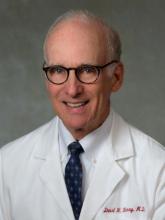Stefan K. Barta, MD, of the University of Pennsylvania, joins David Henry, MD, to discuss the treatment and diagnosis of lymphoma in patients with HIV.
In this week's Clinical Correlation, Ilana Yurkiewicz, MD, has Part 2 of her discussion on informed consent in cancer. Dr. Yurkiewicz is a fellow in hematology and oncology at Stanford University and is also a columnist for Hematology News. More from Dr. Yurkiewicz here.
Notes, Transcripts, Links
Show notes By Emily Bryer, DO Resident in the department of internal medicine, University of Pennsylvania.
- Immunosuppression in patients with HIV, especially with low CD4 counts, is associated with the development of lymphomas.
- Diffuse large B-cell lymphoma is the most common lymphoma in patients with HIV followed by Burkitt lymphoma and Hodgkin lymphoma.
- Extra-nodal manifestations of lymphoma are more common in patients with HIV, especially with lower CD4 counts.
- Following pathologic diagnosis, staging of lymphoma should include:
- CT scan
- PET scan
- Evaluation of CNS (MRI brain and LP)
- Bone marrow biopsy
- Evaluation for hepatitis B and C co-infection.
- Fluorescence in situ hybridization (FISH) is a molecular technique that identifies portions of DNA and helps to identify translocations and rearrangements.
- cMYC, BCL2, and BCL6 are all pro-proliferative genes and commonly implicated in lymphoma.
- cMYC rearrangement pose higher risk of CNS involvement and CNS relapse.
- cMYC rearrangement (as opposed to cMYC translocation) requires therapy that is more aggressive therapy than R-CHOP.
- Treatment of high grade diffuse large B-cell lymphoma:
- R-EPOCH
- Ibrutinib plus R-EPOCH
Resources/Links:
AIDS Malignancy Consortium
Blood. 2004;103:275-82.
Blood. 2010 Apr 15; 115(15): 3008-16.
Clinical Trial: NCT03220022
Ibrutinib, Rituximab, Etoposide, Prednisone, Vincristine Sulfate, Cyclophosphamide, and Doxorubicin Hydrochloride in Treating Patients With HIV-Positive Stage II-IV Diffuse Large B-Cell Lymphomas

